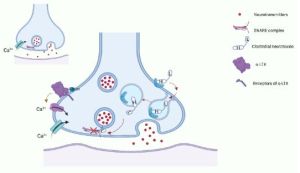Neurotoxins

Neurotoxins are substances that alter the structure or function of the nervous system. They can be found in a variety of natural and human-made sources, including snake venom, pesticides, and even some common substances like alcohol and certain drugs. Here's a detailed overview:
What Are Neurotoxins?[edit | edit source]
Neurotoxins are toxins that specifically target nerve cells (neurons), often by interacting with membrane proteins and ion channels. They can cause a range of effects, from mild symptoms to severe neurological damage.
Common Examples of Neurotoxins[edit | edit source]
- Botulinum Toxin: Produced by the bacterium Clostridium botulinum, it is one of the most potent neurotoxins known. In small doses, it is used medically (e.g., Botox), but in larger doses, it can be deadly.
- Tetrodotoxin: Found in pufferfish and some other marine animals, it blocks sodium channels on neurons, leading to paralysis.
- Lead: A heavy metal that can cause cognitive deficits and neurological damage, especially in children.
- Ethanol (Alcohol): In high concentrations, alcohol can be neurotoxic, affecting coordination and cognitive function.
- Glutamate: An amino acid that is essential for normal brain function but can cause excitotoxicity (neuron damage) in excessive amounts.
Effects on the Nervous System[edit | edit source]
Neurotoxins can cause a variety of effects depending on their mechanism of action and the level of exposure. Some common effects include:
- Paralysis: Many neurotoxins cause paralysis by interfering with the transmission of nerve signals.
- Cognitive Impairment: Exposure to neurotoxins like lead can result in memory loss, learning difficulties, and other cognitive issues.
- Neurological Disorders: Long-term exposure to neurotoxins can contribute to conditions such as Parkinson's disease, Alzheimer's disease, and other neurodegenerative disorders.
- Inflammation: Neurotoxins can cause inflammation in the brain and nervous system, leading to further damage.
Prevention and Treatment[edit | edit source]
Preventing exposure to neurotoxins involves minimizing contact with known sources, such as avoiding contaminated water, using protective equipment when handling chemicals, and adhering to safety guidelines. Treatment may include:
- Antitoxins: Specific antitoxins can neutralize certain neurotoxins.
- Supportive Care: In cases of poisoning, supportive care such as respiratory support and hydration may be necessary.
- Chelation Therapy: Used for heavy metal poisoning, this treatment binds the metal in the bloodstream and helps remove it from the body.
Neurotoxins are a significant concern due to their potential to cause severe and sometimes irreversible damage to the nervous system. Understanding their sources, effects, and methods of prevention and treatment is crucial for protecting public health.